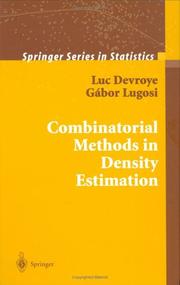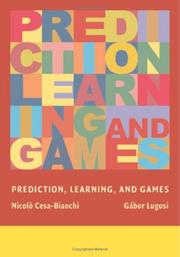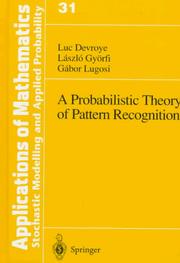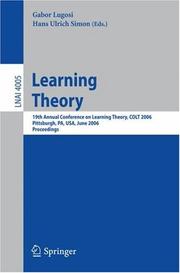| Listing 1 - 10 of 12 | << page >> |
Sort by
|

ISBN: 0387951172 1461265274 1461301254 9780387951171 Year: 2001 Publisher: New York (N.Y.): Springer,
Abstract | Keywords | Export | Availability | Bookmark
 Loading...
Loading...Choose an application
- Reference Manager
- EndNote
- RefWorks (Direct export to RefWorks)
Density estimation has evolved enormously since the days of bar plots and histograms, but researchers and users are still struggling with the problem of the selection of the bin widths. This text explores a new paradigm for the data-based or automatic selection of the free parameters of density estimates in general so that the expected error is within a given constant multiple of the best possible error. The paradigm can be used in nearly all density estimates and for most model selection problems, both parametric and nonparametric. It is the first book on this topic. The text is intended for first-year graduate students in statistics and learning theory, and offers a host of opportunities for further research and thesis topics. Each chapter corresponds roughly to one lecture, and is supplemented with many classroom exercises. A one year course in probability theory at the level of Feller's Volume 1 should be more than adequate preparation. Gabor Lugosi is Professor at Universitat Pompeu Fabra in Barcelona, and Luc Debroye is Professor at McGill University in Montreal. In 1996, the authors, together with Lászlo Györfi, published the successful text, A Probabilistic Theory of Pattern Recognition with Springer-Verlag. Both authors have made many contributions in the area of nonparametric estimation.
Stochastic processes --- Estimation theory --- Combinatorial analysis --- Distribution (Probability theory) --- 519.2 --- 519.21 --- 519.246 --- Combinatorics --- Algebra --- Mathematical analysis --- Estimating techniques --- Least squares --- Mathematical statistics --- Distribution functions --- Frequency distribution --- Characteristic functions --- Probabilities --- Probability. Mathematical statistics --- Probability theory. Stochastic processes --- Statistics of stochastic processes. Estimation of stochastic processes. Hypothesis testing. Statistics of point processes. Time series analysis. Auto-correlation. Regression --- 519.246 Statistics of stochastic processes. Estimation of stochastic processes. Hypothesis testing. Statistics of point processes. Time series analysis. Auto-correlation. Regression --- 519.21 Probability theory. Stochastic processes --- 519.2 Probability. Mathematical statistics --- Statistics . --- Statistical Theory and Methods. --- Statistical analysis --- Statistical data --- Statistical methods --- Statistical science --- Mathematics --- Econometrics

ISBN: 0521841089 9780521841085 9780511546921 0511191782 9780511191787 0511546920 0511189958 9780511189951 051119059X 9780511190599 0511190913 9780511190919 0511191316 9780511191312 1107162955 1280458356 9786610458356 051131602X Year: 2006 Publisher: Cambridge Cambridge University Press
Abstract | Keywords | Export | Availability | Bookmark
 Loading...
Loading...Choose an application
- Reference Manager
- EndNote
- RefWorks (Direct export to RefWorks)
This important text and reference for researchers and students in machine learning, game theory, statistics and information theory offers a comprehensive treatment of the problem of predicting individual sequences. Unlike standard statistical approaches to forecasting, prediction of individual sequences does not impose any probabilistic assumption on the data-generating mechanism. Yet, prediction algorithms can be constructed that work well for all possible sequences, in the sense that their performance is always nearly as good as the best forecasting strategy in a given reference class. The central theme is the model of prediction using expert advice, a general framework within which many related problems can be cast and discussed. Repeated game playing, adaptive data compression, sequential investment in the stock market, sequential pattern analysis, and several other problems are viewed as instances of the experts' framework and analyzed from a common nonstochastic standpoint that often reveals new and intriguing connections.
Game theory. --- Machine learning. --- Computer algorithms. --- Théorie des jeux --- Apprentissage automatique --- Algorithmes --- Théorie des jeux --- Algorithms --- Learning, Machine --- Artificial intelligence --- Machine theory --- Games, Theory of --- Theory of games --- Mathematical models --- Mathematics
Digital
ISBN: 9783540352969 Year: 2006 Publisher: Berlin Heidelberg Springer-Verlag GmbH
Abstract | Keywords | Export | Availability | Bookmark
 Loading...
Loading...Choose an application
- Reference Manager
- EndNote
- RefWorks (Direct export to RefWorks)
Mathematical logic --- Complex analysis --- Computer science --- Artificial intelligence. Robotics. Simulation. Graphics --- complexe analyse (wiskunde) --- informatica --- wiskunde --- logica --- robots

ISBN: 0387946187 9780387946184 146126877X 1461207118 Year: 1996 Volume: 31 Publisher: New York (N.Y.) : Springer,
Abstract | Keywords | Export | Availability | Bookmark
 Loading...
Loading...Choose an application
- Reference Manager
- EndNote
- RefWorks (Direct export to RefWorks)
Pattern recognition presents one of the most significant challenges for scientists and engineers, and many different approaches have been proposed. The aim of this book is to provide a self-contained account of probabilistic analysis of these approaches. The book includes a discussion of distance measures, nonparametric methods based on kernels or nearest neighbors, Vapnik-Chervonenkis theory, epsilon entropy, parametric classification, error estimation, tree classifiers, and neural networks. Wherever possible, distribution-free properties and inequalities are derived. A substantial portion of the results or the analysis is new. Over 430 problems and exercises complement the material.
Stochastic processes --- Artificial intelligence. Robotics. Simulation. Graphics --- Pattern perception. --- Probabilities. --- Perception de structure --- Probabilités --- Probabilities --- Pattern perception --- Probability --- Statistical inference --- Combinations --- Mathematics --- Chance --- Least squares --- Mathematical statistics --- Risk --- Design perception --- Pattern recognition --- Form perception --- Perception --- Figure-ground perception --- Probabilités
Book
ISBN: 9780199535255 0199535256 9781299160057 1299160050 9780191655500 0191655503 0191747106 9780191747106 0191655511 Year: 2013 Publisher: Oxford: Oxford university press,
Abstract | Keywords | Export | Availability | Bookmark
 Loading...
Loading...Choose an application
- Reference Manager
- EndNote
- RefWorks (Direct export to RefWorks)
Concentration inequalities for functions of independent random variables is an area of probability theory that has witnessed a great revolution in the last few decades, and has applications in a wide variety of areas such as machine learning, statistics, discrete mathematics, and high-dimensional geometry. Roughly speaking, if a function of many independent random variables does not depend too much on any of the variables then it is concentrated in the sense that with highprobability, it is close to its expected value. This book offers a host of inequalities to illustrate this rich theory in a
Probabilities. --- Inequalities (Mathematics) --- Probabilités --- Inégalités (Mathématiques) --- Probabilities --- Processes, Infinite --- Probability --- Statistical inference --- Combinations --- Mathematics --- Chance --- Least squares --- Mathematical statistics --- Risk

ISBN: 9783540352945 3540352945 3540352961 Year: 2006 Publisher: Berlin ; New York : Springer,
Abstract | Keywords | Export | Availability | Bookmark
 Loading...
Loading...Choose an application
- Reference Manager
- EndNote
- RefWorks (Direct export to RefWorks)
Computational learning theory --- Artificial intelligence --- Apprentissage informatique, Théorie de l' --- Intelligence artificielle --- Congresses. --- Congrès --- Machine learning --- Computer Science --- Engineering & Applied Sciences --- Théorie de l'apprentissage informatique --- Computer science. --- Computers. --- Algorithms. --- Mathematical logic. --- Artificial intelligence. --- Computer Science. --- Artificial Intelligence (incl. Robotics). --- Computation by Abstract Devices. --- Algorithm Analysis and Problem Complexity. --- Mathematical Logic and Formal Languages. --- AI (Artificial intelligence) --- Artificial thinking --- Electronic brains --- Intellectronics --- Intelligence, Artificial --- Intelligent machines --- Machine intelligence --- Thinking, Artificial --- Bionics --- Cognitive science --- Digital computer simulation --- Electronic data processing --- Logic machines --- Machine theory --- Self-organizing systems --- Simulation methods --- Fifth generation computers --- Neural computers --- Algebra of logic --- Logic, Universal --- Mathematical logic --- Symbolic and mathematical logic --- Symbolic logic --- Mathematics --- Algebra, Abstract --- Metamathematics --- Set theory --- Syllogism --- Algorism --- Algebra --- Arithmetic --- Automatic computers --- Automatic data processors --- Computer hardware --- Computing machines (Computers) --- Electronic calculating-machines --- Electronic computers --- Hardware, Computer --- Computer systems --- Cybernetics --- Calculators --- Cyberspace --- Informatics --- Science --- Foundations --- Computer software. --- Artificial Intelligence. --- Software, Computer
Book
ISBN: 3642044131 364204414X Year: 2009 Publisher: New York : Springer,
Abstract | Keywords | Export | Availability | Bookmark
 Loading...
Loading...Choose an application
- Reference Manager
- EndNote
- RefWorks (Direct export to RefWorks)
This book constitutes the refereed proceedings of the 20th International Conference on Algorithmic Learning Theory, ALT 2009, held in Porto, Portugal, in October 2009, co-located with the 12th International Conference on Discovery Science, DS 2009. The 26 revised full papers presented together with the abstracts of 5 invited talks were carefully reviewed and selected from 60 submissions. The papers are divided into topical sections of papers on online learning, learning graphs, active learning and query learning, statistical learning, inductive inference, and semisupervised and unsupervised learning. The volume also contains abstracts of the invited talks: Sanjoy Dasgupta, The Two Faces of Active Learning; Hector Geffner, Inference and Learning in Planning; Jiawei Han, Mining Heterogeneous; Information Networks By Exploring the Power of Links, Yishay Mansour, Learning and Domain Adaptation; Fernando C.N. Pereira, Learning on the Web.
Computer algorithms --- Machine learning --- Computer Science --- Mechanical Engineering - General --- Mechanical Engineering --- Engineering & Applied Sciences --- Information Technology --- Artificial Intelligence --- Computer science. --- Computer programming. --- Data mining. --- Information storage and retrieval. --- Artificial intelligence. --- Computational linguistics. --- Pattern recognition. --- Computer Science. --- Artificial Intelligence (incl. Robotics). --- Programming Techniques. --- Data Mining and Knowledge Discovery. --- Language Translation and Linguistics. --- Pattern Recognition. --- Information Storage and Retrieval. --- Design perception --- Pattern recognition --- Form perception --- Perception --- Figure-ground perception --- Automatic language processing --- Language and languages --- Language data processing --- Linguistics --- Natural language processing (Linguistics) --- Applied linguistics --- Cross-language information retrieval --- Mathematical linguistics --- Multilingual computing --- AI (Artificial intelligence) --- Artificial thinking --- Electronic brains --- Intellectronics --- Intelligence, Artificial --- Intelligent machines --- Machine intelligence --- Thinking, Artificial --- Bionics --- Cognitive science --- Digital computer simulation --- Electronic data processing --- Logic machines --- Machine theory --- Self-organizing systems --- Simulation methods --- Fifth generation computers --- Neural computers --- Algorithmic knowledge discovery --- Factual data analysis --- KDD (Information retrieval) --- Knowledge discovery in data --- Knowledge discovery in databases --- Mining, Data --- Database searching --- Computers --- Electronic computer programming --- Electronic digital computers --- Programming (Electronic computers) --- Coding theory --- Informatics --- Science --- Data processing --- Programming --- Natural language processing (Computer science). --- Optical pattern recognition. --- Information storage and retrieva. --- Artificial Intelligence. --- Natural Language Processing (NLP). --- NLP (Computer science) --- Artificial intelligence --- Human-computer interaction --- Semantic computing --- Optical data processing --- Pattern perception --- Perceptrons --- Visual discrimination --- Information storage and retrieval systems. --- Automatic data storage --- Automatic information retrieval --- Automation in documentation --- Computer-based information systems --- Data processing systems --- Data storage and retrieval systems --- Discovery systems, Information --- Information discovery systems --- Information processing systems --- Information retrieval systems --- Machine data storage and retrieval --- Mechanized information storage and retrieval systems --- Computer systems --- Electronic information resources --- Data libraries --- Digital libraries --- Information organization --- Information retrieval
Book
ISBN: 9783540352969 Year: 2006 Publisher: Berlin Heidelberg Springer Berlin Heidelberg
Abstract | Keywords | Export | Availability | Bookmark
 Loading...
Loading...Choose an application
- Reference Manager
- EndNote
- RefWorks (Direct export to RefWorks)
This volumecontains paperspresentedatthe19thAnnualConferenceonLea- ing Theory (previously known as the Conference on Computational Learning Theory)heldattheCarnegieMellonUniversityinPittsburgh,USA,June22-25, 2006. The technical program contained 43 papers selected from 102 submissions, 2 open problems selected from among 4 contributed, and 3 invited lectures. The invited lectures were given by Luc Devroye on Random Multivariate Search Trees, by Gy¨ orgy Tur´ an on Learning and Logic, and by Vladimir Vovk on Predictions as Statements and Decisions. The abstracts of these papers are included in this volume. The Mark Fulk Award is presented annually for the best paper co-authored by a student. This year the Mark Fulk award was supplemented with three further awardsfunded by theMachine Learning Journal. We werethereforeable to select four student papers for prizes. The students selected were Guillaume Lecu´ e for the single-author paper Optimal Oracle Inequality for Aggregation of Classi?ers Under Low Noise Condition, Homin K. Lee and Andrew Wan for the paper DNF are Teachable in the Average Case (co-authored by Rocco A. Servedio), Alexander A. Sherstov for the paper Improved Lower Bounds for LearningtheIntersectionsofHalfspaces (co-authoredbyAdamR.Klivans),and D´ avid P´ alfor the paper A Sober Look at Clustering Stability (co-authoredby Ulrike von Luxburg and Shai Ben-David).
Mathematical logic --- Complex analysis --- Computer science --- Artificial intelligence. Robotics. Simulation. Graphics --- complexe analyse (wiskunde) --- informatica --- wiskunde --- logica --- robots
Digital
ISBN: 9783642044144 Year: 2009 Publisher: Berlin, Heidelberg Springer Berlin Heidelberg
Abstract | Keywords | Export | Availability | Bookmark
 Loading...
Loading...Choose an application
- Reference Manager
- EndNote
- RefWorks (Direct export to RefWorks)
Mathematical statistics --- Computer science --- Information systems --- Artificial intelligence. Robotics. Simulation. Graphics --- Computer. Automation --- Translation science --- Linguistics --- patroonherkenning --- IR (information retrieval) --- factoranalyse --- informatica --- vertalen --- linguïstiek --- database management --- KI (kunstmatige intelligentie) --- robots --- AI (artificiële intelligentie)
Book
ISBN: 9783642044144 Year: 2009 Publisher: Berlin Heidelberg Springer Berlin Heidelberg
Abstract | Keywords | Export | Availability | Bookmark
 Loading...
Loading...Choose an application
- Reference Manager
- EndNote
- RefWorks (Direct export to RefWorks)
This book constitutes the refereed proceedings of the 20th International Conference on Algorithmic Learning Theory, ALT 2009, held in Porto, Portugal, in October 2009, co-located with the 12th International Conference on Discovery Science, DS 2009. The 26 revised full papers presented together with the abstracts of 5 invited talks were carefully reviewed and selected from 60 submissions. The papers are divided into topical sections of papers on online learning, learning graphs, active learning and query learning, statistical learning, inductive inference, and semisupervised and unsupervised learning. The volume also contains abstracts of the invited talks: Sanjoy Dasgupta, The Two Faces of Active Learning; Hector Geffner, Inference and Learning in Planning; Jiawei Han, Mining Heterogeneous; Information Networks By Exploring the Power of Links, Yishay Mansour, Learning and Domain Adaptation; Fernando C.N. Pereira, Learning on the Web.
Mathematical statistics --- Computer science --- Information systems --- Artificial intelligence. Robotics. Simulation. Graphics --- Computer. Automation --- Translation science --- Linguistics --- patroonherkenning --- IR (information retrieval) --- factoranalyse --- informatica --- vertalen --- linguïstiek --- database management --- KI (kunstmatige intelligentie) --- robots
| Listing 1 - 10 of 12 | << page >> |
Sort by
|

 Search
Search Feedback
Feedback About UniCat
About UniCat  Help
Help News
News